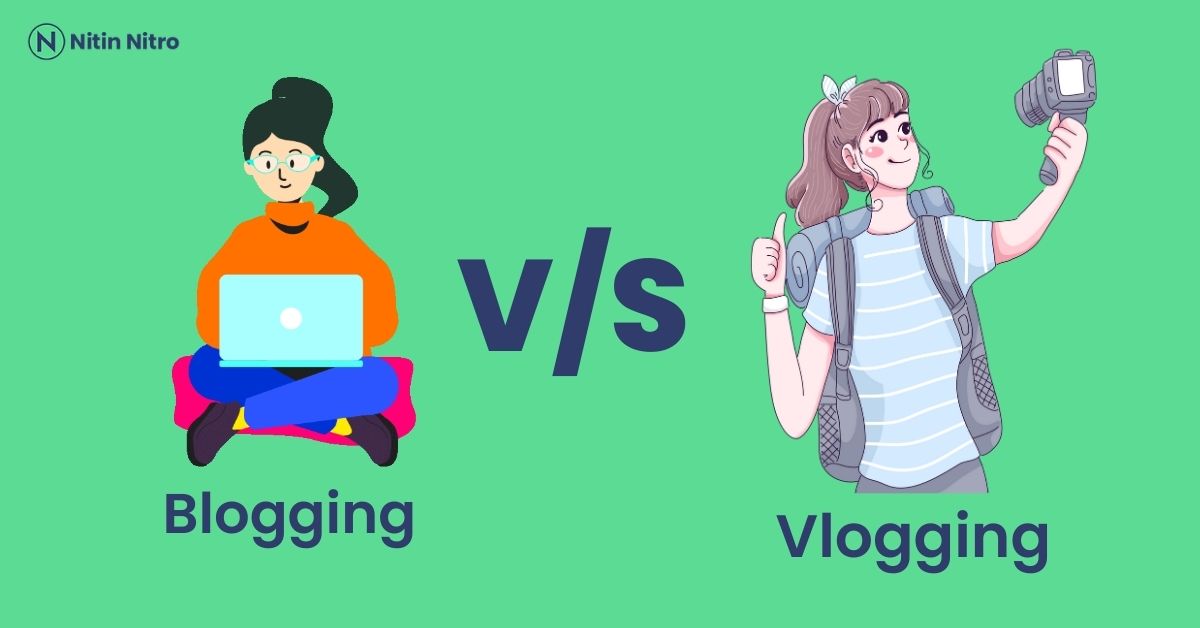Well, you’re not alone! Choosing between blogging and vlogging can be tough because you have a lot of questions in mind like – which is profitable, which is easy to do, and which takes less time.
In the world of online content creation, two of the most popular formats are blogging and vlogging. Both have their unique advantages and disadvantages. So which one should you choose to start creating online content?
In this article, I made this tough thing easy to understand even a 12-year-old boy can understand it easily. So let’s dive in:
What is Blogging?
A blog is an online journal or informational website that is updated regularly with new posts covering various topics. Blogs can be run by one person or by a group of contributors. Posts on a blog tend to be primarily text-based, although images and videos can be included as well.
Some key advantages of blogging include:
- Low barrier to entry – Starting a blog is very easy and affordable. All you need is a website and something to write about.
- Flexibility in topics – You can write blog posts about any topic that interests you. There’s no need to stick to one niche.
- Opportunity to build an audience – Through search engine optimization and social media promotion, blogs allow you to build an audience around your knowledge and expertise.
- Potential to monetize – Blogs can generate income through advertisements, affiliate marketing, sponsored posts, ebooks and online courses.
- Control over your work – You have full control over your blog’s design and content. Bloggers have creative freedom.
What is Vlogging?
A vlog is a video blog. Instead of writing blog posts, vloggers create video content and publish it online. Vlogs are like video journals – the vlogger speaks directly into the camera to share thoughts, ideas, stories, tutorials, product reviews and more. Vlogging requires some type of visual content whether that’s the vlogger’s face, a slideshow, or footage of something interesting.
Some key advantages of vlogging include:
- Personable – Viewers feel more connected to the vlogger because they can see and hear them. Vlogs allow your personality to shine.
- Higher engagement – Videos tend to be more engaging than text. Viewers are more likely to watch a whole video than read a long blog post.
- Viral potential – Viral videos can spread rapidly online, allowing vloggers to gain subscribers fast. Videos can easily be shared on social media.
- Memorable – People remember video content better than text. So you’re more likely to make an impact with a vlog.
- Good for tutorials – Vlogs are ideal for step-by-step tutorials that show a process visually.
Also Read: How to start a YouTube channel and make money?
Key Differences Between Blogging and Vlogging
| Factor | Blogging | Vlogging |
| Content format | Text-based | Video-based |
| Ease of getting started | Very easy, just need a website | Slight learning curve with video editing and on-camera skills |
| Production time | Faster to produce content | Shooting and editing videos is more time-consuming |
| Equipment needed | Computer for writing | Camera, microphone, lighting, editing software |
| Skill set required | Writing skills | On-camera presence, video editing skills |
| Content Format | More challenging but possible | Easier to develop a connection through video |
| Opportunities for monetization | Ads, affiliate links, products | Ads, sponsorships, affiliate links, products |
| SEO optimization | Easier to optimize text content for search | Harder to rank for keywords in competitive niches |
| Audience connection | Readers appreciate quality content | Ability to build a personal brand |
As you can see, both blogging and vlogging have their pros and cons. The option you choose depends on your goals, skills, and interests.
How to Choose Between Blogging and Vlogging?
When deciding whether to start a blog or vlog, here are some key factors to consider:
Your Goals
What are you hoping to accomplish? For example, if your main goal is to drive traffic to an online business, blogging may be better suited because text content is easier to optimize for search engines. If your goal is to build a strong personal brand and connection with your audience, vlogging may allow you to showcase your personality in a more engaging format.
Your Interests and Skills
Do you enjoy writing or find it easier to express your ideas through speaking into a camera? Leverage your natural skills and interests to determine the best format for you. Blogging takes strong writing abilities while vlogging requires on-camera confidence.
Desired Content Style
The format of your content will differ between blogs and vlogs. Blog posts are focused on text, research, images and quotes. Vlogs rely on your personality, visuals, editing techniques and speaking skills. Decide on the overall style you want for your content.
Subject Matter
Certain topics may lend themselves better to one format over the other. For example, step-by-step tutorials are ideal for video, while in-depth guides may be better as blog posts. Evaluate your niche to determine the optimal format.
Time Commitment
Vlogging is generally more time-intensive than blogging. You have to record, edit and produce videos which could take hours per vlog. Compare the time you have available to the effort required for each type of content production.
Your Audience
Research your target audience. Do they seem to engage more with video or text-based content online? Producing content in their preferred format could help you gain traction.
By weighing factors like these, you’ll get a good sense of whether you should start a blog or vlog. You don’t necessarily have to choose one or the other either. Many content creators leverage both formats to reach a wider audience.
Tips for Starting a Successful Blog
If you’ve weighed the pros and cons and decided blogging is the right choice, here are some tips to launch and grow a successful blog:
- Pick a compelling niche – Choose a specific niche or area of expertise that you’re passionate about and knowledgeable about rather than blogging about random topics. This will help you build a loyal readership.
- Have a unique perspective – Offer a fresh take on your niche to stand out from other bloggers. Share your personal experiences, insights, and ideas.
- Create keyword-focused content – Research keywords and incorporate them naturally into your writing to improve search visibility and traffic.
- Write long-form in-depth posts – Aim for at least 1,500 words per blog post. Long-form content ranks well in search and keeps readers engaged.
- Promote your blog content – Leverage social media, email lists, and guest posting opportunities to promote your blog posts to new audiences.
- Consistently publish new content – Blog regularly, at least once a week. New content will keep readers coming back and signals to search engines that your blog is active.
- Monetize strategically – Once you build traffic, add affiliate links, display ads, sponsored posts, and products. Don’t overload your blog with ads.
By sticking to these blogging best practices, you can build an audience and potentially generate income from your expertise.
Also Read:
Tips for Starting a Successful Vlog
If vlogging seems like the best avenue for you, here are some tips to launch a successful vlog:
- Choose a niche – Like blogging, it’s wise to focus your vlog on a specific niche rather than a variety of random topics. Pick a niche you’re passionate about that fits your personality and skills.
- Improve your on-camera presence – Get comfortable speaking to the camera. Work on eliminating vocal fillers like “umm” and “like.” Practice to improve your on-camera charisma.
- Invest in starter equipment – You’ll need at least an entry-level camera, microphone and tripod. Good lighting and editing software are also essential.
- Plan your content strategy – Brainstorm exciting vlog video ideas that will intrigue viewers within your niche. Create an editorial calendar to map out your content plan.
- Learn video editing principles – Familiarize yourself with editing software. Study basic principles like shot sequencing, transitions, and text overlays to enhance your videos.
- Optimize your videos for discovery – Include keyword-focused titles, descriptions, and tags. Create custom thumbnails. Promote new videos on social media.
- Engage with your audience – Respond to all comments. Ask viewers questions to encourage interaction. Building a community leads to subscriber growth.
- Stay consistent – Post new vlogs on a regular schedule, at least once a week. Consistency is key to building a loyal viewership on YouTube and other platforms.
Stay focused on providing value through engaging videos, and your vlogging efforts can pay off in the form of growing view counts, subscribers, and potential revenue streams.
What is more profitable blogging or vlogging?
How much money bloggers and vloggers can make depends on many things, like
- the kind of content they make ( niche )
- how many people watch or read it, ( Audience size )
- and how they make money from it. ( Monetization Method )
- Also depends upon competition, market changes, algorithm updates, etc.
Some bloggers and vloggers can make a lot of money, while others don’t make much.
On average, bloggers in the US can earn anywhere from a few thousand dollars to hundreds of thousands of dollars per year, depending on how popular their blog is and what they write about.
Vloggers can also earn a lot of money, with some making millions of dollars per year from advertising and sponsorships.
However, making money from blogging or vlogging takes a lot of work and time. It can take months or even years to build an audience and start making money. Plus, how much money bloggers and vloggers make can change depending on things like competition, changes in the market, and algorithm updates.
Certainly, here are some examples of potential income for bloggers and vloggers in India:
- A travel blogger in India who has 100,000 monthly page views and earns Rs. 7 per page view through advertising could potentially earn Rs. 7 lakhs per month ($9,500) from advertising revenue alone.
- A beauty vlogger in India who has 1 million subscribers on YouTube could potentially earn Rs. 3 lakhs to Rs. 15 lakhs per month ($4,000 to $20,000) from advertising revenue, depending on the number of views their videos receive.
- A fashion blogger in India who has 500,000 monthly page views could potentially earn Rs. 75 lakhs or more per year ($100,000) through a combination of advertising, sponsorships, and affiliate marketing.
It’s important to note that these are just estimates, and the actual income of bloggers and vloggers in India can vary greatly depending on various factors, such as the niche, audience size, location, and monetization methods used.
Which is easier blogging or vlogging?
Whether blogging or vlogging is easier depends on some factors:
Writing skills: If you enjoy writing and are good at it, then blogging may be easier for you. Blogging involves creating written content, so good writing skills are essential.
Speaking skills: On the other hand, if you are comfortable speaking in front of a camera and enjoy being in front of an audience, then vlogging may be easier for you. Vlogging involves creating video content, so good speaking and presenting skills are important.
Equipment: Blogging requires a computer or mobile device with a good internet connection and word processing software. Vlogging requires a camera or smartphone with good video quality and editing software.
Time commitment: Both blogging and vlogging require a significant time commitment, but blogging may require more time upfront for research, writing, and editing, while vlogging may require more time for filming and editing videos.
Are vlogs more popular than blogs?
Younger audiences tend to like vlogs more than blogs because they like watching videos. However, blogs are still popular among those who like reading and engaging with written content.
It’s important to know that both platforms can work together. Some bloggers put videos into their blog posts, and some vloggers use social media to bring people to their blogs. The popularity of each platform depends on how well the content creator makes their content interesting and good quality for their audience.
Should I start a blog or YouTube channel?
Deciding whether to create a blog or a YouTube channel depends on a few things like what you’re interested in, what you’re good at, and what you want to achieve. Here are some things to think about:
- What you like and what you’re good at: If you like writing and you’re good at it, you might prefer blogging. If you’re comfortable in front of a camera and you like making videos, you might prefer YouTube.
- What you want to achieve: Think about what you want to accomplish by creating content. Do you want to make money, build a personal brand, or share your knowledge with others? Knowing your goals can help you pick the right platform.
- What you want to talk about and who you want to reach: Some topics work better in written form, while others are better suited to video. For example, if you want to show off your travel experiences, a YouTube channel might be the best way to go.
- What resources you have: Starting a blog is generally cheaper than starting a YouTube channel because you don’t need as much equipment. You can start a blog with just a computer and an internet connection while making videos requires more gear like a camera and microphone.
Why videos are better than blogs?
Videos can be better than blogs for a few reasons:
- They look cool: Videos can have more cool stuff in them than written content. You can add pictures, animations, and effects to make your message stand out and get people’s attention.
- They feel personal: When you see and hear someone speak, it can feel like they’re talking directly to you. This can make the content feel more personal and make people more likely to interact with it.
- They’re easy to watch: Videos are good to watch when you’re doing other things, like working out or going somewhere. You can listen and watch at the same time, so it’s more convenient than reading.
- They help with Google: Videos can help your website show up higher in Google search results. Google likes video content, so having videos on your website or YouTube channel can be good for getting more views.
Final Thought
Launching a blog or vlog are both great ways to start sharing your knowledge, passion, and expertise online. With the tips in this guide, you’re equipped to decide which platform may work better for you based on your specific goals, interests, and style.
Both blogging and vlogging require consistency, high-quality content, and promotion. But by leveraging your strengths in your chosen format, you can start building a dedicated audience around your brand.
FAQs
Which is easier to monetize – a blog or vlog?
Generally, vlogs tend to be easier to monetize because of the potential for higher viewer engagement and the availability of revenue streams like YouTube Partner Program ads. However, blogs can also be monetized through affiliate links, display ads, sponsored posts, ebooks, online courses etc.
Can I do both blogging and vlogging?
Absolutely! Many content creators use both blogging and vlogging as complementary formats. You can create a vlog and then repurpose the content into a blog post. Or you can use your blog posts as scripts for videos. Leveraging both formats will allow you to reach a wider audience.
Which format has a higher ROI?
ROI or return on investment can be high for both blogs and vlogs, but vlogs tend to have a higher ROI if you can build a sizable viewership. The videos themselves don’t cost much to produce but have the potential for good AdSense earnings.
What equipment do I need to start vlogging?
At the bare minimum, you’ll need a camera and tripod. But ideally you should invest in basic lighting and an external microphone for better video quality. Editing software is also essential. Start with entry-level gear and upgrade as you grow.
How much does it cost to start a blog?
The good news is starting a blog is very affordable. Many blogging platforms like WordPress.com are free. Self-hosting with WordPress.org costs less than $100 per year for web hosting. You can start a successful blog without spending much.
How much time does it take to record and edit a vlog?
It depends on the length and complexity, but on average, experienced vloggers spend 1-3 hours recording and 2-4 hours editing to produce a 10-15 minute vlog. So you should set aside 5-7 hours per video. It gets faster with practice.





